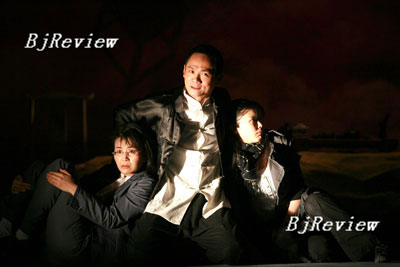| Home / China-Japan Year of Cultural & Sports Exchanges / News | Tools: Save | Print | E-mail | Most Read |
| A 'Village' Spans Two Nations |
| Adjust font size: |
By Yuan Yuan In 1906, some Chinese students who were studying in 2007 is also the 35th anniversary of the establishment of diplomatic relations between
Co-written and co-directed by Chinese director Li Liuyi and Japanese director Oriza Hirata, the drama The story takes place in a small, remote village in San Ye, an antiques dealer, spends his whole life trying to make money and achieve a high social status. Li Hua, the manager of the tea house who was abandoned by her husband, looks forward to his return and a peaceful life. Wei Zi is eager to become a policeman, and his life's goal is to maintain public order and be in a position of authority. The amateur archeologist wants nothing material, and he fancies that the artifacts might come from another part of the universe. Meanwhile, Mr. and Mrs. Sakurada from "The drama has no detailed plot, it just tells fantasies," Director Li said. "It describes different people's opinions of history, and calls for peace in the global village. Each of the 13 characters, by their own story, expresses the notion that everybody has a dream." Li is regarded as one of the representatives of the new generation of theater directors of Li said that he and Mr. Hirata have been friends for many years. "His dramas focus more on the superposition of life conditions, while I pay more attention to spiritual superposition. But in essence, our ideas have many things in common," he said. Director Hirata has won many prizes internationally for his works. He developed "contemporary colloquial theater theory," which has had a strong influence on Japanese theater. "Drama is an import from the West for both A major concern History is one of Hirata's major concerns in creating dramas. "We shouldn't forget history, nor do we limit ourselves in history. Thinking about how to deal with history is one of our responsibilities in modern society," he said. "Every time we talk about the history of Talking about the cooperation with Chinese actors, Hirata said the interesting difference between the actors of the two countries is that Japanese actors are inclined to rehearse a play starting with segments and moving on to the whole work, while Chinese do just the opposite. "The Japanese actors start rehearsals section by section according to the script one hour earlier than the Chinese every day, and then both sides rehearse the whole drama. After that, the Chinese actors stay to discuss the details further," Hirata said. Li added that Japanese actors work very hard step by step to make every detail perfect, and bycomparison, Chinese actors show another kind of style: they are serious about the art but they show this attitude in a relaxed way." The 13 actors in this drama, eight from "The tone of Japanese is very smooth, not as cadenced as Chinese. The function of language in drama is just like music. Our two different languages will play a symphony on the stage," said Lin Xiyue, a Chinese actor who plays the role of Piao Ge. As an unprecedented collaborative theater project among the the Hong Kong Arts Festival, the National Theater Company of China and the New National Theater in Tokyo, the play has finished its show at the China National Children's Art Theater in Beijing and will be performed at the New National Theater in Tokyo in May. "The Hong Kong Arts Festival can become the best platform for artists from both "I hope that this drama can reflect the real conditions of how the people of both countries react to history," said Hirata. ( |
| Tools: Save | Print | E-mail | Most Read |
 |
| Related Stories |
 |
 |
|
 |
| Links |
